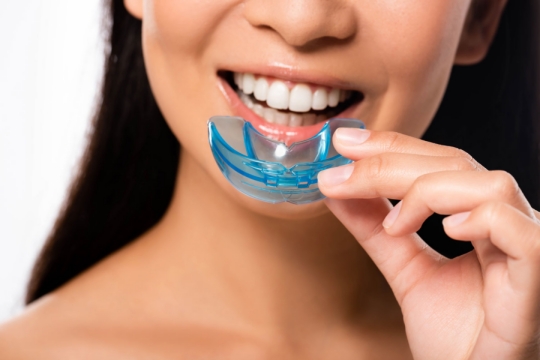
Maintaining optimal oral health involves more than just regular brushing and flossing; it also includes protecting your teeth from potential damage. One effective way to do this is by using mouthguards. While many people may think of mouthguards solely as sports accessories, they serve various important roles in preventive dental care. This blog will explore the different types of mouthguards, their benefits, and how they can contribute to oral health.
What Are Mouthguards?
Mouthguards are protective devices designed to cover the teeth and gums. They come in different types and are made from various materials, but their primary function is to cushion and protect the teeth and jaw during physical activities or while sleeping.
Types of Mouthguards
- Sports Mouthguards: These are often worn by athletes to protect against dental injuries during contact sports like football, boxing, and basketball. Sports mouthguards are typically thicker and more robust than other types.
- Night Guards: These are used by individuals who grind their teeth at night, a condition known as bruxism. Night guards help prevent tooth wear, jaw pain, and other related issues.
- Orthodontic Retainers: After braces treatment, retainers are often used to maintain teeth in their new positions. While not traditional mouthguards, they provide protection and stability to teeth.
- Custom-Fit Mouthguards: These are specially made by dental professionals to fit the individual’s mouth precisely, offering the best protection and comfort.
Benefits of Mouthguards
1. Prevention of Dental Injuries
One of the most significant benefits of mouthguards, especially sports mouthguards, is their protection against dental injuries. They can absorb impact during falls or collisions, reducing the risk of chipped, cracked, or knocked-out teeth. This is especially crucial for children and teenagers who participate in sports, as dental injuries can lead to long-term consequences and costly treatments.
2. Protection Against Teeth Grinding
For individuals who grind their teeth at night, wearing a night guard can significantly reduce the wear and tear on teeth. Teeth grinding can lead to various issues, including:
- Tooth Sensitivity: As enamel wears down, teeth may become more sensitive to temperature changes.
- Jaw Pain: Grinding can cause strain on the jaw muscles, leading to discomfort and even temporomandibular joint (TMJ) disorders.
- Headaches: The tension from grinding can result in tension headaches.
A night guard creates a barrier between the upper and lower teeth, preventing direct contact and minimizing the associated problems.
3. Improved Comfort During Dental Procedures
Mouthguards can provide comfort and protection for patients undergoing certain dental procedures, such as braces or other orthodontic appliances. They can help prevent irritation to the cheeks and gums from braces, making the overall experience more pleasant.
4. Long-Term Cost Savings
Investing in a mouthguard can lead to significant long-term savings. By preventing dental injuries and the need for restorative work, such as crowns, bridges, or implants, mouthguards can help you avoid costly dental treatments. Additionally, addressing bruxism early with a night guard can prevent the need for more extensive treatments later.
5. Encouragement of Healthy Habits
Using a mouthguard can also promote healthy oral hygiene practices. For athletes, wearing a mouthguard can serve as a reminder to prioritize oral health, while individuals using night guards can be more aware of their teeth-grinding habits and make conscious efforts to manage stress and anxiety.
Choosing the Right Mouthguard
Selecting the appropriate mouthguard depends on individual needs and circumstances. Here are some factors to consider:
- Type of Activity: A sports mouthguard is essential if you engage in contact sports. A custom-fit night guard may be the best option for those with bruxism.
- Fit and Comfort: Custom-fitted mouthguards made by dental professionals offer the best comfort and protection. While over-the-counter options are available, they may not fit as securely.
- Material: Mouthguards come in various materials, ranging from soft to hard. Your dentist can recommend the best material based on your needs.
- Professional Guidance: It is crucial to consult with your dentist. They can assess your specific situation and recommend the most suitable type of mouthguard.
Caring for Your Mouthguard
Proper care and maintenance of your mouthguard are essential to ensure its effectiveness and longevity. Here are some tips:
- Clean After Each Use: Rinse your mouthguard with water and gently brush it with a toothbrush and mild soap to remove bacteria and debris.
- Store Properly: Keep your mouthguard in a ventilated case to protect it from damage and allow it to dry.
- Avoid Heat: Do not expose your mouthguard to high temperatures, which can distort its shape.
- Regular Check-ups: During routine dental visits, ask your dentist to inspect your mouthguard for wear and tear. If you’re concerned about your dental health in Bistupur, don’t hesitate to reach out to a specialist. Omkarananda Dental Care, a trusted dental clinic in Bistupur, is here to guide you through personalized treatment options.
Conclusion
Mouthguards play a crucial role in preventive dental care, offering protection against dental injuries, alleviating the effects of bruxism, and promoting long-term oral health. Whether you’re an athlete looking to safeguard your smile or someone dealing with teeth grinding, investing in the right mouthguard can make a significant difference in your dental health journey. If you’re considering a mouthguard, consult your dentist to discuss the best options for your needs and lifestyle. Remember, a healthy mouth contributes to your overall well-being, so take the necessary steps to protect it.







